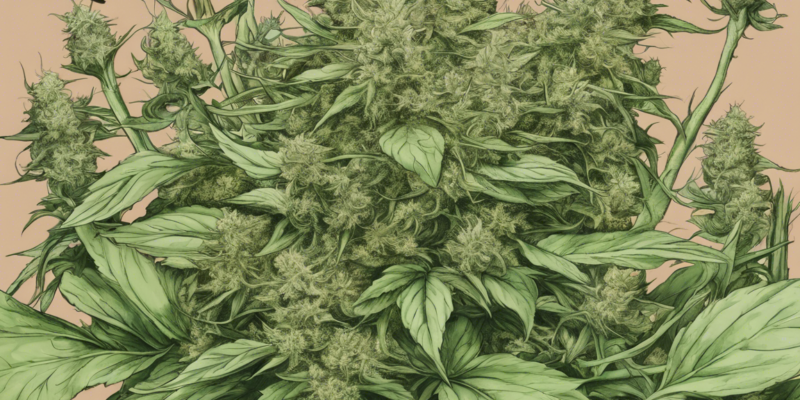
What’s THC: A Beginner’s Guide
What is THC?
**
THC, or delta-9-tetrahydrocannabinol, is the primary psychoactive component found in cannabis. It is one of over 100 cannabinoids present in the plant, with THC being mostly responsible for the “high” or euphoric feeling often associated with marijuana use. When THC** is consumed, it binds to cannabinoid receptors in the brain and central nervous system, leading to various effects on mood, memory, perception, and pain sensation.
How Does THC Work?
**
THC interacts with the body’s endocannabinoid system, a complex network of receptors and neurotransmitters that help regulate various physiological functions. The two main cannabinoid receptors in the body are CB1 and CB2. THC, specifically, binds to CB1 receptors in the brain and nervous system, altering neurotransmitter release and affecting neural activity. This interaction is what produces the characteristic effects of THC**, such as euphoria, relaxation, altered perception, and increased appetite.
Methods of Consumption
**
There are several ways to consume THC**, each with its onset time and duration of effects. Common methods of consumption include:
- Smoking: Inhaling THC-rich cannabis flowers or concentrates through smoking is one of the fastest ways to feel the effects. The effects typically peak within 10-30 minutes and can last for a few hours.
- Vaping: Vaporizing THC concentrates or flower heats the substance at a lower temperature than combustion, producing vapor to inhale. This method is considered less harmful than smoking and provides a quicker onset of effects.
- Edibles: THC can be infused into various food and drink products, such as gummies, chocolates, and beverages. Edibles take longer to take effect (30 minutes to 2 hours) but can produce more potent and longer-lasting effects.
- Topicals: Creams, balms, and lotions infused with THC can be applied directly to the skin for localized relief without the psychoactive effects associated with other methods of consumption.
- Tinctures: Liquid extracts of cannabis, including THC, that are typically administered sublingually (under the tongue) for faster absorption into the bloodstream.
Health Benefits and Medical Uses
**
THC** has been studied for its potential therapeutic benefits in treating various medical conditions, including:
- Pain Relief: THC has analgesic properties and may help alleviate chronic pain conditions, such as arthritis, neuropathy, and migraines.
- Nausea and Vomiting: THC can help reduce nausea and vomiting in cancer patients undergoing chemotherapy or individuals with gastrointestinal disorders.
- Appetite Stimulation: THC is known to stimulate appetite, making it beneficial for individuals with conditions like HIV/AIDS or eating disorders.
- Neurological Disorders: Some research suggests that THC may be effective in managing symptoms of conditions like multiple sclerosis, epilepsy, and Parkinson’s disease.
- Mood Disorders: While the effects can vary, some individuals find relief from symptoms of depression, anxiety, and PTSD with THC consumption.
Potential Side Effects
**
While THC** can offer therapeutic benefits, it is essential to be aware of potential side effects, including:
- Impairment: THC can impair cognitive and motor functions, affecting coordination, reaction time, and judgment. It is not recommended to operate heavy machinery or drive under the influence of THC.
- Psychological Effects: In some individuals, THC can induce anxiety, paranoia, or psychosis, especially at high doses. It is crucial to start with low doses and monitor how your body responds.
- Cardiovascular Effects: THC can temporarily increase heart rate and blood pressure, which may be concerning for individuals with heart conditions.
- Respiratory Irritation: Smoking or vaping THC can irritate the lungs and respiratory system, potentially leading to coughing or respiratory issues.
Legal Status
**
The legal status of THC varies worldwide. In some regions, cannabis containing THC is legal for recreational and/or medical use, while in others, it remains illegal. It is essential to familiarize yourself with the laws and regulations concerning THC** in your area before purchasing or consuming it.
FAQs
**
1. Is THC the same as CBD?
No, THC (tetrahydrocannabinol) and CBD (cannabidiol) are two different cannabinoids found in cannabis. THC** is psychoactive and responsible for the “high,” while CBD is non-psychoactive and known for its potential therapeutic benefits.
2. Can you overdose on THC?
While it is unlikely to be lethal, consuming high doses of THC can lead to significant discomfort, anxiety, and impaired cognitive function. It is essential to consume THC responsibly and in moderation.
3. How long does THC stay in your system?
The detection window for THC in urine can vary depending on various factors, such as frequency of use, metabolism, and potency of the product. In general, THC can be detected in urine for up to 30 days in heavy users.
4. Can you become addicted to THC?
While THC itself is not considered physically addictive like opioids, some individuals may develop a psychological dependence on THC. Regular, heavy use of THC can lead to tolerance and withdrawal symptoms upon cessation.
5. Can THC help with insomnia?
THC can have sedative effects, making it potentially helpful for individuals struggling with insomnia. However, it is essential to be cautious as THC can also disrupt sleep patterns and lead to dependency.
6. What is the entourage effect?
The entourage effect is the theory that cannabis compounds, including THC and CBD, work better when consumed together rather than in isolation. It suggests that the combined effects of multiple cannabinoids, terpenes, and other compounds in cannabis may enhance therapeutic benefits.
In conclusion, THC is a potent cannabinoid with both recreational and medical applications. Understanding its effects, potential benefits, and risks is essential for responsible consumption. Whether for pain relief, relaxation, or therapeutic purposes, THC can offer a diverse range of experiences for individuals exploring the world of cannabis.
